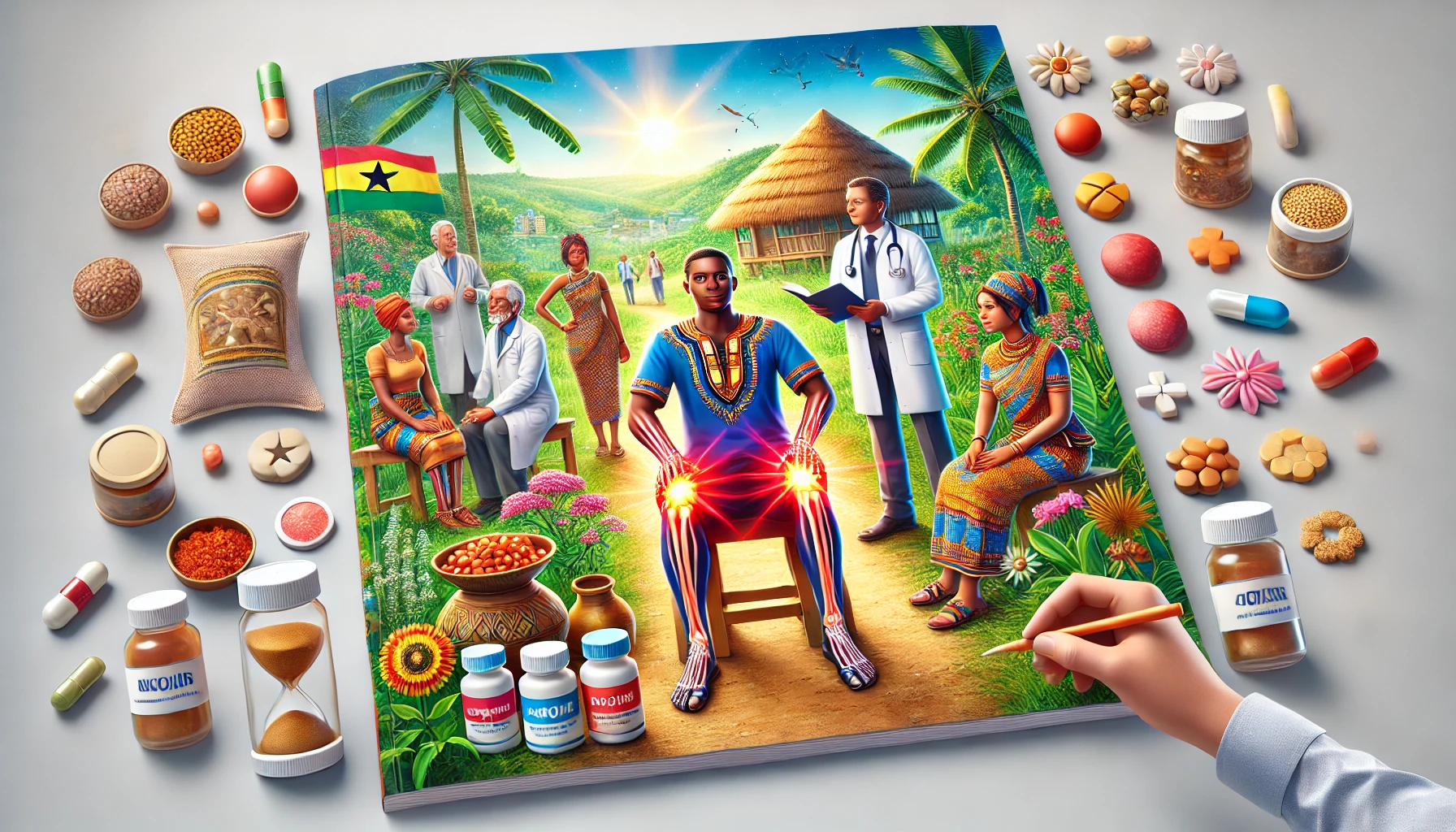
🦵💪 Painful Truths: Tackling Rheumatism as a Ghanaian – Symptoms & Solutions 🌟🇬🇭
Rheumatism is a word many Ghanaians use to describe pain and swelling in the joints and muscles. It is an umbrella term for various conditions that affect the joints, muscles, and surrounding tissues. People in Ghana often worry about rheumatism—some think it can be transmitted, some believe it can be cured by specific herbs, and others are unsure if it is the same as arthritis. This article will break down everything you need to know about rheumatism in a way that is easy to understand. We will also address myths, complications, and the best ways to get help.
1. What Exactly Is Rheumatism?
The term “rheumatism” (pronounced roo-ma-ti-zum) refers to several conditions that affect the joints, muscles, and connective tissues. While it is no longer used as a strict medical diagnosis in many places, Ghanaians commonly use the word to describe pain, stiffness, and swelling around the joints.
- Is rheumatism the same as arthritis? Not exactly. Arthritis is a specific type of joint inflammation, while “rheumatism” is a broader term for conditions causing chronic pain in joints and muscles. So, arthritis can be considered one of many forms of rheumatism.
- Is rheumatism the same as rheumatoid arthritis? No. Rheumatoid arthritis is a specific autoimmune disease. It is just one cause of rheumatism, but there are other types such as osteoarthritis, gout, and fibromyalgia.
Images are only illustrative; may not pass an academic critique
2. Causes of Rheumatism
Different factors can contribute to developing rheumatism, including:
- Autoimmune Reactions: Some types of rheumatism (like rheumatoid arthritis) happen when the body’s immune system attacks its own tissues.
- Genetics: Certain people may be more prone to rheumatism because it runs in their family. However, it does not always mean you will definitely develop it if your parent has it.
- Infections: Although rare, some infections can lead to rheumatic conditions (for example, rheumatic fever which follows untreated strep throat). However, rheumatism is not typically transmitted from one person to another.
- Age and Wear and Tear: As we grow older, the cartilage in joints can break down, leading to osteoarthritis, which many call “rheumatism” too.
- Lifestyle Factors: Being overweight or leading a sedentary lifestyle can add more strain to the joints, contributing to symptoms.
Myth to Address: Some people in Ghana believe that cold weather or rains alone cause rheumatism. While cooler temperatures can worsen joint pain in people who already have rheumatism, cold by itself does not directly cause it.
3. Signs and Symptoms
Rheumatism can affect different parts of the body in various ways:
- Joint Pain and Swelling: The most common symptom. This pain can be in the knees, hands, wrists, ankles, or spine. Some may feel worse when it is cold or during rainy seasons.
- Stiffness: Especially in the morning or after long periods of rest.
- Warmth and Redness: Joints may feel warm to the touch and appear slightly red.
- Back Pain: Rheumatism can cause persistent lower back pain, making it hard to bend or lift heavy items.
- Chest Pain: In rare cases, inflammation can affect areas around the rib cage, leading to chest discomfort.
- Swollen Feet: Fluid accumulation and joint inflammation may cause feet and ankles to swell.
- General Fatigue: Some people feel tired or unwell because of chronic inflammation.
Other Common Questions:
- Can rheumatism cause body itching? Usually, it doesn’t directly cause itching unless there is an associated skin condition or side effects from medications.
- Can rheumatism cause headaches, stroke, or high blood pressure? Rheumatism itself doesn’t usually cause these problems, but severe long-term inflammation and stress on the body can contribute to other complications if not managed properly.
Images are only illustrative; may not pass an academic critique
4. Common Myths in Ghana About Rheumatism
- “Rheumatism can be cured by one traditional herb or concoction.” Many herbalists or traditional healers claim to have a perfect cure. While some natural remedies can relieve pain, there is no single magical cure for rheumatism. It often requires a combination of treatments.
- “Rheumatism can be transmitted from person to person.” Generally, rheumatism is not contagious. You cannot catch arthritis or rheumatoid arthritis by sitting close to someone or sharing personal items.
- “Rheumatism can kill.” Rheumatism itself rarely causes death directly. However, untreated rheumatic diseases can lead to complications over time, especially if the heart or other organs are involved. It’s critical to get proper medical care to manage the condition.
- “Rheumatism is only a problem for old people.” While rheumatic issues often affect older adults, children and younger adults can also be affected (e.g., juvenile rheumatism).
5. Complications if Left Untreated
Without proper management, rheumatism can lead to:
- Permanent Joint Damage: Chronic inflammation can destroy cartilage and even bones.
- Deformities: Hands and feet may become misshapen if the condition worsens.
- Heart Problems: In some types of rheumatic diseases, the heart can be affected, leading to rheumatic heart disease.
- Reduced Quality of Life: Constant pain and stiffness can make it difficult to carry out daily tasks, affecting a person’s physical and emotional well-being.
Images are only illustrative; may not pass an academic critique
6. Diagnosis and Treatment in Ghana
Diagnosis
To determine if you have rheumatism (and which type), a doctor may:
- Ask about your symptoms and medical history.
- Conduct a physical exam.
- Order blood tests to check for signs of inflammation (e.g., rheumatoid factor, anti-CCP, ESR, CRP).
- Request X-rays or scans to see if there is any damage to the joints.
Visiting a healthcare professional is crucial to ensure you get an accurate diagnosis. Self-diagnosis can lead to ineffective or even harmful treatments.
Treatment Options
Medications
- Pain Relievers (Analgesics): Such as paracetamol or NSAIDs (e.g., ibuprofen) to reduce pain and inflammation.
- Disease-Modifying Antirheumatic Drugs (DMARDs): Used especially for rheumatoid arthritis to stop joint damage.
- Steroids: Sometimes prescribed short-term to control severe inflammation.
Lifestyle Changes
- Regular Exercise: Simple activities like walking, swimming, or gentle stretching can help keep joints flexible and reduce stiffness.
- Healthy Diet: A balanced diet rich in fruits, vegetables, and whole grains can help maintain a healthy weight and reduce inflammation.
- Weight Management: Reducing extra weight puts less strain on your joints.
- Adequate Rest: Balancing activity with enough rest helps the body recover.
Therapy
- Physical Therapy Physiotherapists can teach exercises to increase flexibility, strength, and endurance, while reducing pain.
- Heat and Cold Therapy Some people find relief by applying heat packs or cold packs to the affected joints.
- Surgery (Rare Cases) In severe cases where joint damage is advanced, surgery might be needed to repair or replace damaged joints.
Myth: Some might say, “If you have rheumatism, avoid all movement.” In reality, gentle exercise often helps reduce pain and stiffness.
Images are only illustrative; may not pass an academic critique
7. Prevention and Self-Care
While not all rheumatic conditions can be prevented, you can reduce your risk or manage symptoms better:
- Maintain a Healthy Weight: Extra weight strains joints, especially in the knees and hips.
- Stay Active: Engage in moderate physical activities regularly.
- Eat Nutritious Foods: Focus on diets rich in calcium, vitamin D, and other minerals that support bone health.
- Protect Your Joints: Use appropriate equipment when lifting heavy objects and maintain good posture.
- Seek Early Treatment: If you notice persistent joint pain or swelling, see a doctor. Early diagnosis and treatment prevent major complications.
8. Frequently Asked Questions
- Can rheumatism cause death? It is rare for rheumatism to directly cause death. However, complications from severe or untreated rheumatic diseases can be serious.
- Can rheumatism be cured completely? Many forms of rheumatism, particularly autoimmune types, are chronic. They can be managed, but not always completely cured. However, early and proper treatment can help people live normal, active lives.
- Can rheumatism cause back pain and chest pain? Yes. Inflammation can occur in the spine or around the rib cage, causing back or chest discomfort. Any severe chest pain should be checked by a doctor to rule out other serious causes.
- Is rheumatism hereditary? Some types have a genetic component, but having a parent with rheumatism does not guarantee you will develop it. Lifestyle, infections, and other factors also play a role.
- How do you pronounce rheumatism? Rheumatism is pronounced “roo-ma-ti-zum.”
Images are only illustrative; may not pass an academic critique
9. Conclusion
Rheumatism is an umbrella term for conditions that cause pain, stiffness, and swelling in the joints and muscles. In Ghana, many myths surround this condition—some claim it can be cured by a single herb or transmitted from one person to another. It is important to understand that rheumatism is usually not contagious and that there is no one-size-fits-all cure. Proper treatment often includes medication, lifestyle changes, and sometimes physical therapy or surgery. With early diagnosis and a good treatment plan, most people can continue to live active and healthy lives despite having a rheumatic condition.
If you or a loved one in Ghana experiences persistent joint pain or stiffness, seek proper medical advice at a hospital or clinic. Avoid relying solely on unproven remedies or myths. Working closely with a healthcare provider gives you the best chance to manage rheumatism effectively, prevent complications, and maintain a good quality of life.
- Pain in Ghana Explained: What Hurts, Why, and What to Do 🤕 😭
- Body Signals: 🤧🤒Decoding the Most Common Symptoms in Daily Life 🤮– Part 1
- High Blood Pressure: How Much is Too High? - What Every Ghanaian Should Know 🏃♂️💖🩺
- Health Insurance Policies in Ghana for the Ordinary Ghanaian: A Complete Guide 🏥💊🛡️
- Sudden Death in Ghana: 50 Common Causes, Their Prevention, and Treatment 💀🦴⚰️

We Love to Educate for Free
But please do not self-medicate as wrong doses of even correct medications can cause serious complications like kidney failure and even death. You can talk to a LICENSED health professional (including medical doctors, specialists, physician assistants, clinical psychologists, nutritionists/dieticians, medical herbalists, etc) by downloading the Deluxe Hospital app here:










